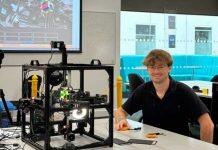A collaborative project to improve breastfeeding and the use of human milk in premature babies has been awarded a $2.5 million grant from the National Health and Medical Research Council’s Centres of Research Excellence Scheme.


Researchers from the University of Adelaide and the South Australian Health and Medical Research Institute (SAHMRI) will work with other leading experts to investigate why breastfeeding rates are lower in premature infants and develop ways to improve lactation support for mothers.
“We know maternal milk greatly improves outcomes of prematurity, including cognitive development. Despite this, breastfeeding rates among these tiny, vulnerable babies are significantly lower than full-term infants and haven’t improved in the past twenty years,” said Chief Investigator Professor Alice Rumbold, who is a perinatal epidemiologist for the University of Adelaide and SAHMRI, and works for the University’s Robinson Research Institute.
Breastfeeding premature babies can be challenging because they may be unable to suckle at birth, have high nutrient needs and early birth can also affect maternal milk supply.
“By working with families and health care providers, we hope to improve breastfeeding support after birth by designing and evaluating lactation support strategies in neonatal units and developing new nutritional interventions that harness the unique components of human milk,” said Professor Rumbold.
The project will also explore ways to optimise the use of donor human milk, including how much donor or maternal milk is needed to deliver the best benefits for very preterm babies.
“THIS FUNDING WILL ENABLE US TO BUILD THE CAPABILITIES OF A COHORT OF EARLY CAREER RESEARCHERS TO UNDERTAKE AND TRANSLATE RESEARCH TO GIVE PRETERM INFANTS THE BEST START IN LIFE.”
-Professor Alice Rumbold, Perinatal Epidemiologist, The University of Adelaide and SAHMRI.
Babies are considered premature when they are born before 37 weeks gestation.
Some may require lengthy hospital stays and can be at risk of cognitive and motor impairments, behavioural disorders and chronic health conditions.
“Preterm birth is a major public health issue with around 25,000 infants in Australia born prematurely each year,” said Professor Rumbold.
“This funding will enable us to build the capabilities of a cohort of early career researchers to undertake and translate research to give preterm infants the best start in life.”
A team of researchers spanning multiple universities are involved in this project.
Professor Rumbold’s team secured an NHMRC Clinical Trials and Cohort Studies grant of $2.2 million in May for a donor milk study known as the GIFT trial.
The NHMRC Centres of Research Excellence Scheme aims to provide support for teams of researchers to pursue collaborative research and promote or improve translation of research outcomes into policy and practice.








































